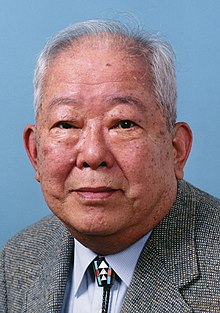Masatoshi Koshiba | |
|---|---|
 Photograph of Koshiba published in 2002 | |
| Born | September 19, 1926 |
| Died | November 12, 2020 (aged 94) Tokyo, Japan |
| Nationality | Japanese |
| Alma mater | University of Tokyo University of Rochester |
| Known for | Astrophysics, neutrinos |
| Awards | Humboldt Prize (1997) Wolf Prize in Physics (2000) Nobel Prize in Physics (2002) |
| Scientific career | |
| Fields | Physics |
| Institutions | University of Chicago George Washington University University of Tokyo Tokai University |
| Thesis | High energy electron-proton cascade in cosmic radiation (1955) |
| Doctoral advisor | Morton F. Kaplon |
| Other academic advisors | Shin'ichirō Tomonaga Takahiko Yamanouchi |
| Doctoral students | Yoji Totsuka Atsuto Suzuki |
| Other notable students | Takaaki Kajita |
Masatoshi Koshiba (小柴 昌俊, Koshiba Masatoshi, 19 September 1926 – 12 November 2020) was a Japanese physicist and one of the founders of neutrino astronomy. His work with the neutrino detectors Kamiokande and Super-Kamiokande was instrumental in detecting solar neutrinos, providing experimental evidence for the solar neutrino problem.
Koshiba won the Nobel Prize in Physics in 2002, jointly with Raymond Davis Jr., "for pioneering contributions to astrophysics, in particular for the detection of cosmic neutrinos".
He was a senior counselor at the International Center for Elementary Particle Physics (ICEPP) and professor at the University of Tokyo.